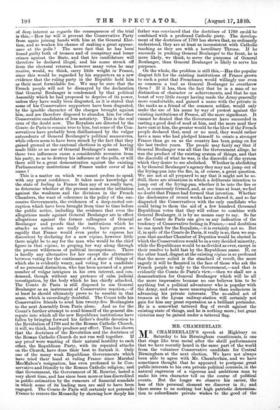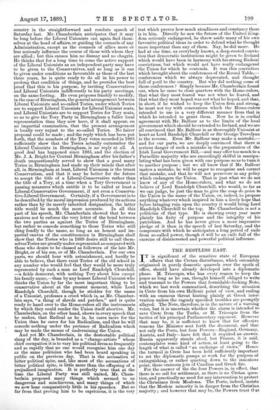MR. CHAMBERLAIN.
MR. CHAMBERLAIN'S speech at Highbury on Saturday to his Birmingham constituents, is one that rings like true metal after the shrill performances that we have recently heard in the same part of the world from the volunteer Conservative candidate for Central Birmingham at the next election. We have not always been able to agree with Mr. Chamberlain, and we have sometimes thought that he appeared to postpone great public interests to his own private political counsels, in the natural eagerness of a vigorous and ambitious man to make his own character tell on the course of political events. But the longer we observe his career, the less of this personal element we discover in it ; and there seems to us nothing but high patriotic determina- tion to subordinate private wishes to the good of the country in the straightforward and resolute speech of Saturday last. Mr. Chamberlain anticipates that it may be long before the Liberal Unionists can again find them- selves at the head of affairs, or guiding the counsels of any Administration, except as the counsels of allies more or less seriously influence the course of those with whom they are allied ; but this causes him no dismay and no chagrin. He thinks that for a long time to come the active support of the Liberal Unionists as an independent party may have to be given to the Conservatives, and so long as it can be given under conditions as favourable as those of the last three years, he is quite ready to do all in his power to prolong that condition of things, and he provides the best proof that this is his purpose, by inviting Conservatives and Liberal Unionists indifferently to his party meetings, on the same footing. He even proposes frankly to modify, in the case of Birmingham, the general arrangement between Liberal Unionists and so-called Tories, under which Tories are to support Liberal Unionists for Liberal Unionist seats, and Liberal Unionists are to support Tories for Tory seats, so as to give the Tory Party in Birmingham a fuller local representation than they now have, if it shall appear, on an impartial examination, that the present arrangement is locally very unjust to the so-called Tories. No fairer proposal could be made ; and the reply which has been put forth, that the numbers of the Tory votes recorded in 1885 sufficiently show that the Tories actually outnumber the Liberal Unionists in Birmingham, is no reply at all. A good deal has happened since 1885, and the election of Mr. J. A. Bright for Central Birmingham after his father's death unquestionably served to show that a good many Tories in Birmingham had made up their minds that after all, in Birmingham at least, Liberal Unionism is the truest Conservatism, and that it may be better for the future to accept the title of a Liberal-Conservative rather than the title of a Tory, at a time when a Tory Government is passing measures which entitle it to be called at least a Liberal-Conservative Government, if not even a Conserva- tive-Liberal Government. Certainly, if a Government is to be described:by the moral impression produced by its actions rather than by its merely inherited designation, the latter title would be much the more accurate. In all this part of his speech, Mr. Chamberlain showed that he was anxious not to enforce the very letter of the bond between the two parties as against the Tories of Birmingham, but rather to concede something to those Tories who still cling fondly to the name, so long as an honest and im- partial canvas of the constituencies in Birmingham shall show that the Tories who in 1889 desire still to call them- selves Tories are greatly under-represented as compared with those who desire to be classed as followers of the late Mr. Bright, or of his son, or of Mr. Chamberlain. For our own parts, we should hear with astonishment, and hardly be able to believe, that there exist Tories of the old school in any number who would feel that they would be more truly represented by such a man as Lord Randolph Churchill, —a fickle democrat, with nothing Tory about him except his family name,—than by any honest Liberal Unionist who thinks the Union by far the most important thing to be conservative about at the present moment, while Lord Randolph Churchill, though he stickles for the name of a Unionist, professes a creed which is, as Mr. Chamber- lain says, " a thing of shreds and patches," and is quite ready to hand over to the Home-rulers all the instruments by which they could render the Union itself abortive. Mr. Chamberlain, on the other hand, shows in every speech that he makes, that Radical as he is, he cares more for the Union than he cares for his Radicalism, and that he will concede nothing under the pretence of Radicalism which may be made the means of undermining the Union. And yet Mr. Chamberlain, in the destestable political slang of the day, is branded as a " change-artiste " whose chief occupation it is to vary his political dress so frequently and so rapidly that no one would recognise him one day as the same politician who had been heard speaking in public on the previous day. That is the accusation of bitter political spite, and, like most of the accusations of bitter political spite, is little more than the offspring of a prejudiced imagination. It is perfectly true that at the time the Liberal Party was still united, Mr. Cham- berlain proposed many things which seemed to us dangerous and mischievous, and many things of which we now hear comparatively little in his speeches. But so far from that proving him to be capricious, it is the very test which proves how much steadiness and constancy there is in him. Directly he saw the future of the United King- dom seriously endangered, he threw aside many of his own favourite political ideas in order to defend what he thought more important than any of them. Nay, he did more. He had at one time, as everybody knows, a deep-rooted convic- tion that democratic institutions might be given to Ireland which would have been in harmony with his strong Radical convictions, but which would not have really endangered the Union for which he contends. It was this conviction which brought about the conferences of the Round Table,— conferences which we always deprecated, and thought full of peril to the country. But why did nothing come of those conferences ? Simply because Mr. Chamberlain found out, when he came to close quarters with the Home-rulers, that what they most feared was not what he feared, and that what they most hoped was not what he hoped, and that, in short, if he wished to keep the Union firm and strong, he must not toy with concessions which the Home-rulers intended to use in a very different manner from that in which he intended to grant them. Now he is in cordial agreement with Mr. Balfour as to the limits of the local government which should be extended to Ireland. and we are all convinced that Mr. Balfour is as thoroughly Unionist at heart as Lord Randolph Churchill or Sir George Trevelyan is the reverse. Even Mr. Balfour may make a mistake,— and for our parts, we are deeply convinced that there is serious danger of such a mistake in the preparation of the Irish Local Government Bill,—and may offer too much to a Parnellite majority who are exceedingly skilful in manipu- lating what has been given with one purpose so as to turn it to another purpose ; but we all know that if Mr. Balfour makes a mistake, he will be eager to recognise and correct that mistake, and that he will not persevere in any policy which endangers the Union. That is just what we do not know of any of the Home-rulers, and what we do not believe of Lord Randolph Churchill, who would, so far as we can judge, be just the man to give the coup de grace to the Union in the name of the Union, or, indeed, to propose anything whatever which inspired in him a lively hope that before bringing ruin upon the country it would bring Lord Randolph Churchill to the top. Mr. Chamberlain is not a politician of that type. He is showing every year more plainly his fixity of purpose and the integrity of his patriotism. And he has never given a more impressive pledge of it than in the speech of last Saturday, and the composure with which he anticipates a long period of exile from so-called power, though it will be an exile full of the exercise of disinterested and powerful political influence.



































 Previous page
Previous page